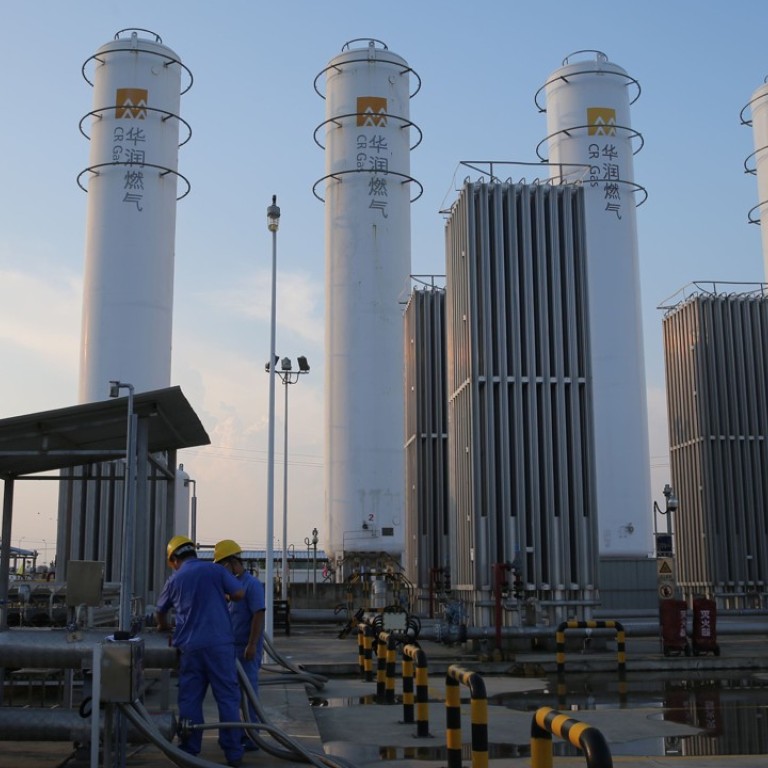
China pollution fight will lead to record year for natural gas demand, but not terrible shortages and price spikes, experts say
- Last year, many villagers were left without heat after Beijing’s ‘war on pollution’ accelerated plans to replace boilers and stoves using coal with units using natural gas, overwhelming the supply of the cleaner burning fuel.
Demand for natural gas in mainland China will surge to another record this winter, but the severe shortages and wild price spikes seen last year won’t reappear, experts say.
“This winter’s gas supply would be still on the tight side, but overall not far off from being in balance with demand,” said Zhi Xiaoye, president of Beijing Gas Group, the city’s largest gas supplier and one of the largest distributors nationally. It is part of Hong Kong-listed municipal government-controlled conglomerate Beijing Enterprises.
Mainland China’s consumption for the cleaner burning fuel surged 17.7 per cent year on year in the year’s first nine months, faster than the 15.3 per cent recorded in the whole of last year, according to the National Development and Reform Commission, which regulates the industry.
China, which last year overtook South Korea as the world’s second-largest importer of natural gas in liquefied form, accounted for just over a third of global natural gas demand growth so far this year, according to Sanford Bernstein senior analysts Neil Beveridge.
For the year’s first 10 months, China’s domestic production grew 6.3 per cent from the same period last year, while imports jumped by a third, said the National Bureau of Statistics.
The sharp jump in imports means China’s gas import dependency will rise further above last year’s 40 per cent, adding weight to President Xi Jinping’s call earlier this year for the industry to boost domestic supply.

Demand jumped last year after Beijing’s “war on air pollution” accelerated plans to eliminate coal-fired boilers at factories and coal stoves in homes, replacing them with cleaner burning gas-fired units.
But during cold snaps, many villagers were hit by a major shortage of gas supply and had no heating alternative as their coal-fired units had already been dismantled. That forced local governments to abruptly suspend gas supply to commercial and industrial users to divert it to households.
Even though China has doubled its gas storage capacity to 6.5 per cent of demand, it is still well below 15 to 20 per cent in the US and Europe, Beveridge noted.

“Feedback from market participants is that preparations [by the big three state-backed suppliers] are far better this year than a year ago … while [the] gas price will rise, we do not expect as extreme a spike in spot market prices as last winter,” he added.
Doing its part to relieve tight supply, Zhi said Beijing Gas aims to complete a third-phase expansion of its imported liquefied natural gas (LNG) processing terminal in Caofeidian near Tianjin, which will see its annual capacity rise to 10 million tonnes by 2020 from 6.5 million tonnes currently.
He is also co-chairman of Beijing Gas Blue Sky Holdings, which is 41 per cent held by Beijing Gas and owns 29 per cent of the terminal. Blue Sky also trades LNG and operates gas distribution franchises in five mainland cities.
Its share price was sent into a free fall earlier this month due to liquidation of shares in the stock market by a cash-strapped foreign fund house, said Dennis Bai Yuxing, Blue Sky’s senior vice-president of corporate finance and investor relations, without naming it.
In the half-hour to 10am on November 15, some 400 million Blue Sky shares were dumped in panic selling, he noted, causing its share price to plunge to as low as 13 HK cents from 44.5 HK cents before closing at 25 HK cents.
Some 2.2 billion shares changed hands that day, highly unusual for a small capitalisation stock with 9.8 billion shares issued at the end of last year.
Zhi said the current price does not reflect the company’s business potential given completion of the 29 per cent terminal stake acquisition in June and potential LNG trading growth from the terminal’s expansion.
The stock closed at 25.5 HK cents on Friday.

